Tennesseans generally support Age-Appropriate Materials Act of 2022 and amendment
According to the most recent Tennessee Poll conducted by the Applied Social Research Laboratory at East Tennessee State University, most Tennesseans support the Age-Appropriate Materials Act of 2022 (66%) and its subsequent amendment of 2023 (68%).
In 2022, Tennessee legislators passed the Age-Appropriate Materials Act, which requires school libraries and classrooms to maintain a list of materials in the library collection, to have a policy to screen reading materials for “age appropriateness” and to remove materials that do not meet the criteria established. The Act also requires schools to make the list of materials and books publicly available and develop a process for reviewing, evaluating and removing books that are determined to be inappropriate. The law defines materials very broadly to encompass “books, periodicals, newspapers, manuscripts, films, prints, documents, microfilm, discs, cassettes, videotapes, video games, applications, and subscription content in any form” and to include both school and classroom libraries (The Age-Appropriate Materials Act, 20221). In 2023, the amendment to the bill passed, which extends the Act to cover classroom materials and allows parents to challenge specific books.
The Poll asked Tennesseans questions about library and classroom materials available to public school students. A few of those questions asked if they support or oppose the Age-Appropriate Materials Act of 2022 and the associated amendment. See figure 1. Respondents were then asked who they believed was primarily responsible for making decisions about the books and materials that students can check out or use in their school library and classroom. See figures 3a-3b.
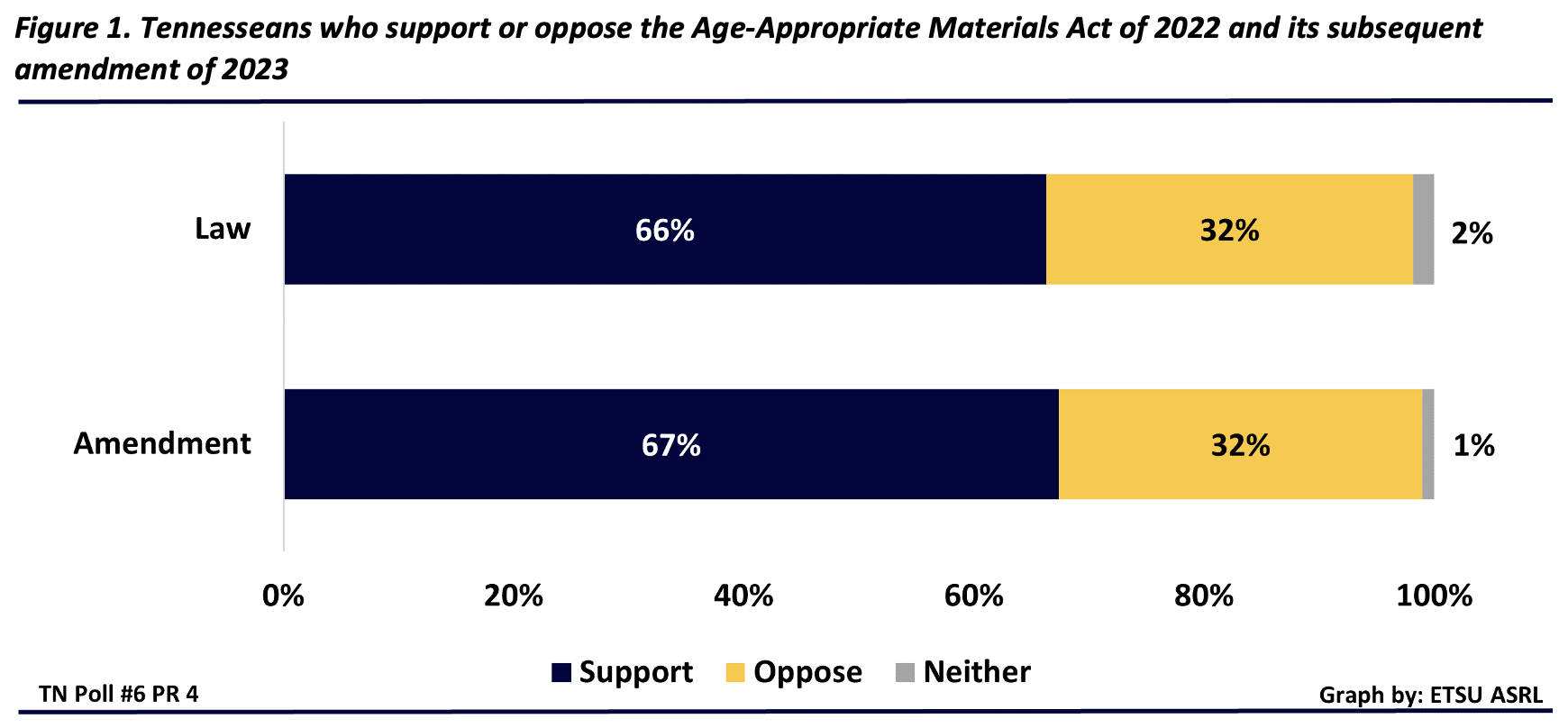
The most significant demographic differences between those who support or oppose the 2022 Act is noticeable in party affiliation, with more Republicans in support (87%) compared to Independents (64%) and Democrats (38%). Alternatively, more Democrats oppose the law (61%) compared to other political affiliations. More male respondents support the Act (73%) compared to female respondents (61%). Respondents in the baby boomer generation were more likely to oppose the 2022 law (40%) than Generation X (30%), millennials (28%), and Generation Z (26%).
When the ASRL cross-tabulated respondents’ education by their support for or opposition to the law and amendment, the results show that those with a bachelor’s degree or higher are significantly more likely to oppose the law and amendment than those with less attained education. Alternatively, those with less than a four-year college degree are more likely to support the law and its amendment. See figure 2.
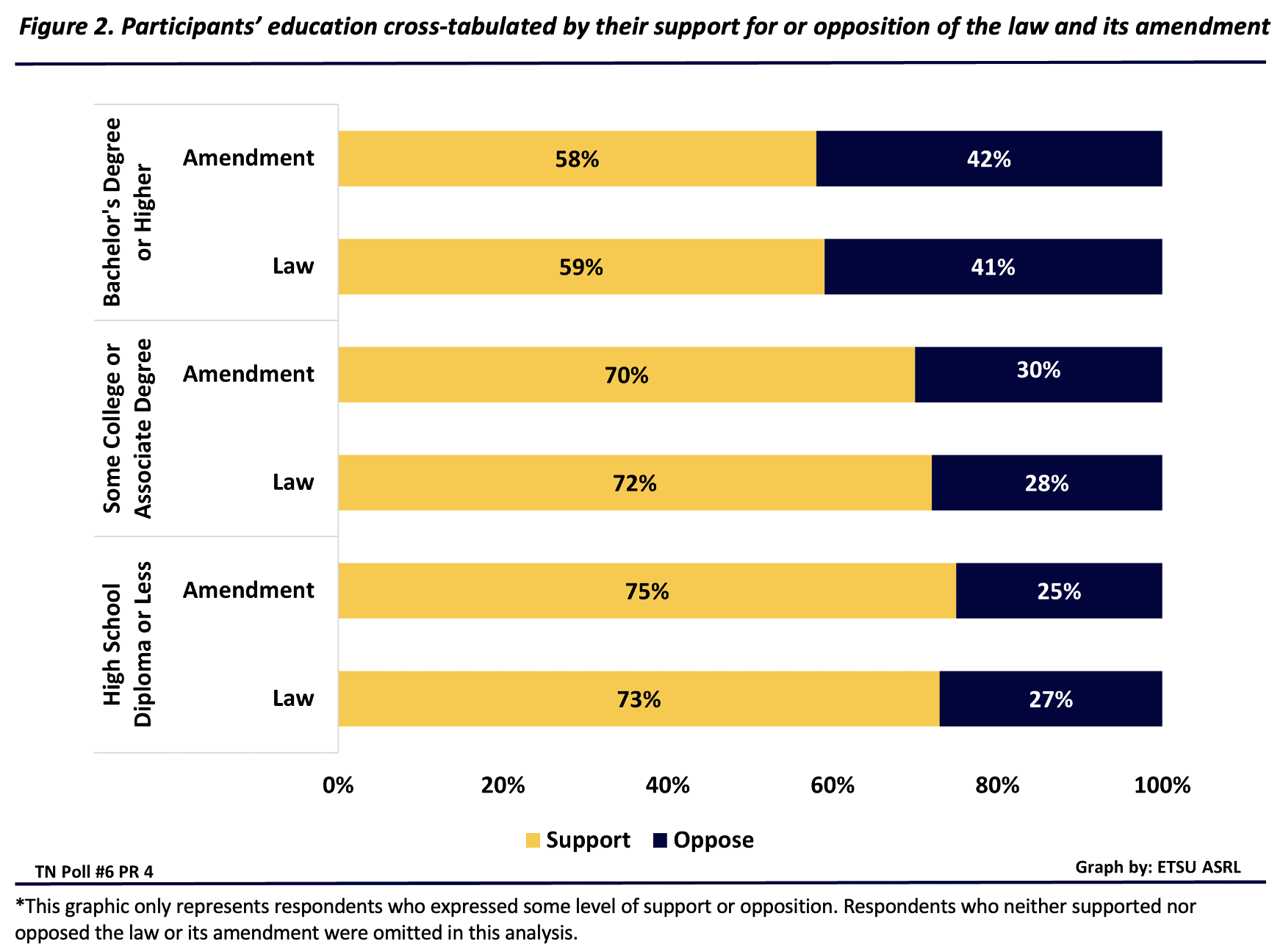
The ASRL was interested in getting Tennesseans’ opinions about who they believe should be primarily responsible for making the decisions about which materials and books should be available for students to check out from their school library. Most Tennesseans believe parents should be responsible (44%). Similarly, we asked Tennesseans who they believe should be primarily responsible for making decisions about which materials and books should be available for students to check out or use in the classroom. Most Tennesseans believe both parents (32%) and teachers (32%) should be responsible. See figures 3a-3b.
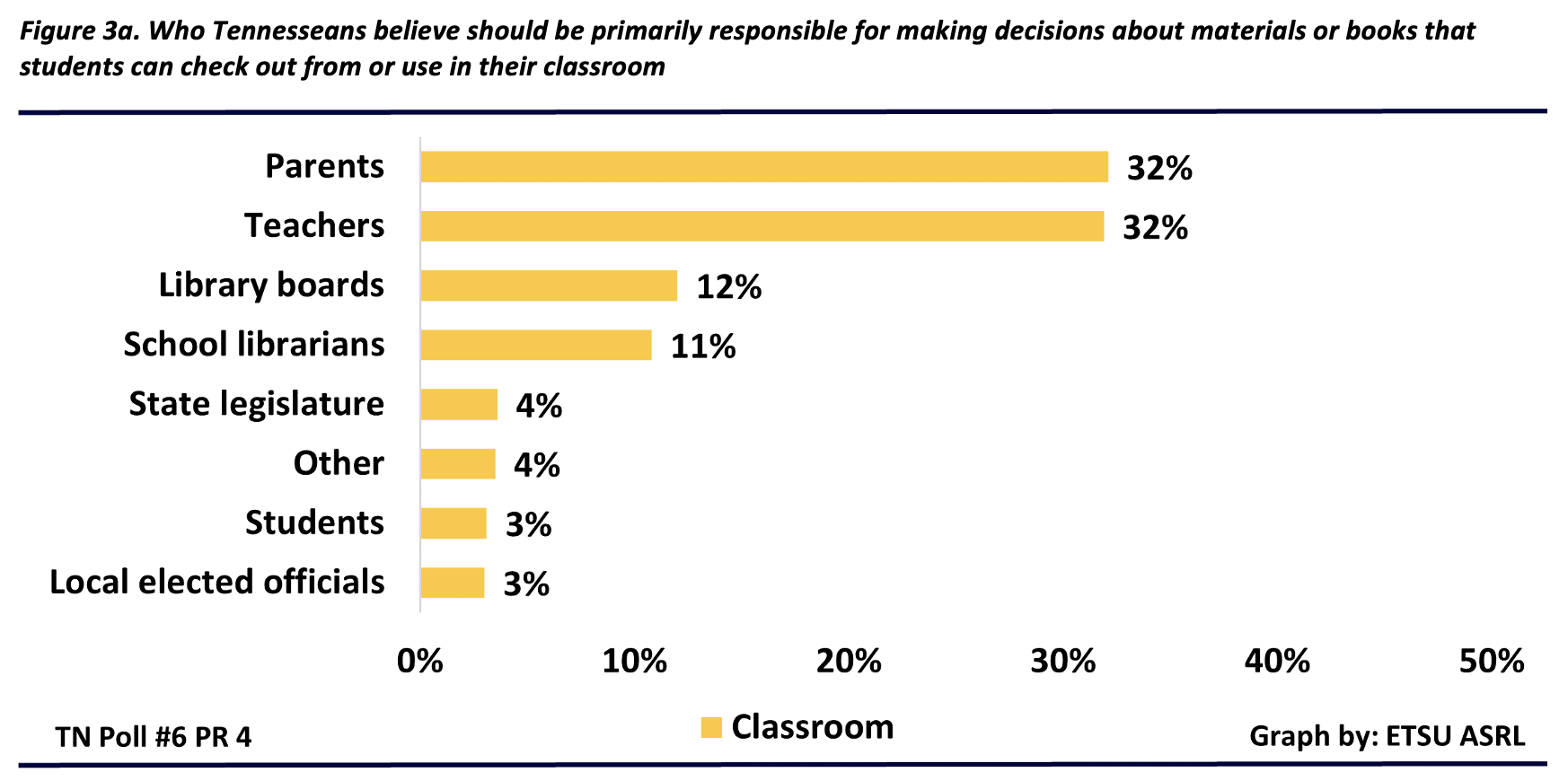
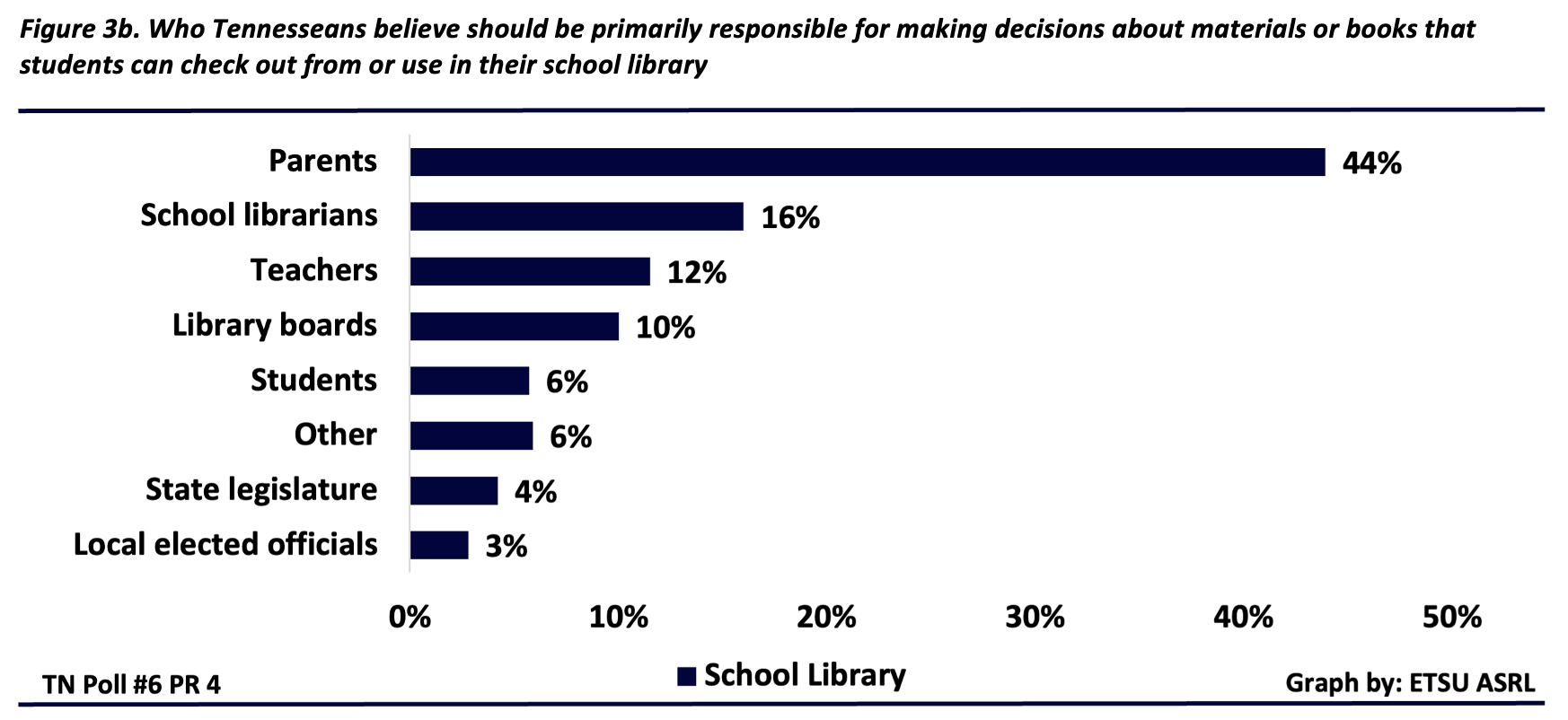
Finally, most Tennesseans are of the opinion that policies that challenge or remove books and other materials serve to protect students by providing learning materials that are appropriate for their age (53%). On the other hand, 47% of Tennesseans believe that these policies disadvantage all students by limiting access to learning. A cross-tabulation of the participants’ education and their opinion about the policy shows that 45% of those who believe that the Age-Appropriate Materials Act and other policies like it protect school-aged kids have a high school diploma or less, followed by those with a bachelor’s degree or higher (32%) and those with some college experience or associate degree (23%). The margin is much closer among those who believe policies like these are disadvantageous, with those who have a high school diploma or less making up 41% while those with a bachelor’s degree or higher make up 38% and those with some college or associate degree make up 21% of the overall. See figure 4.
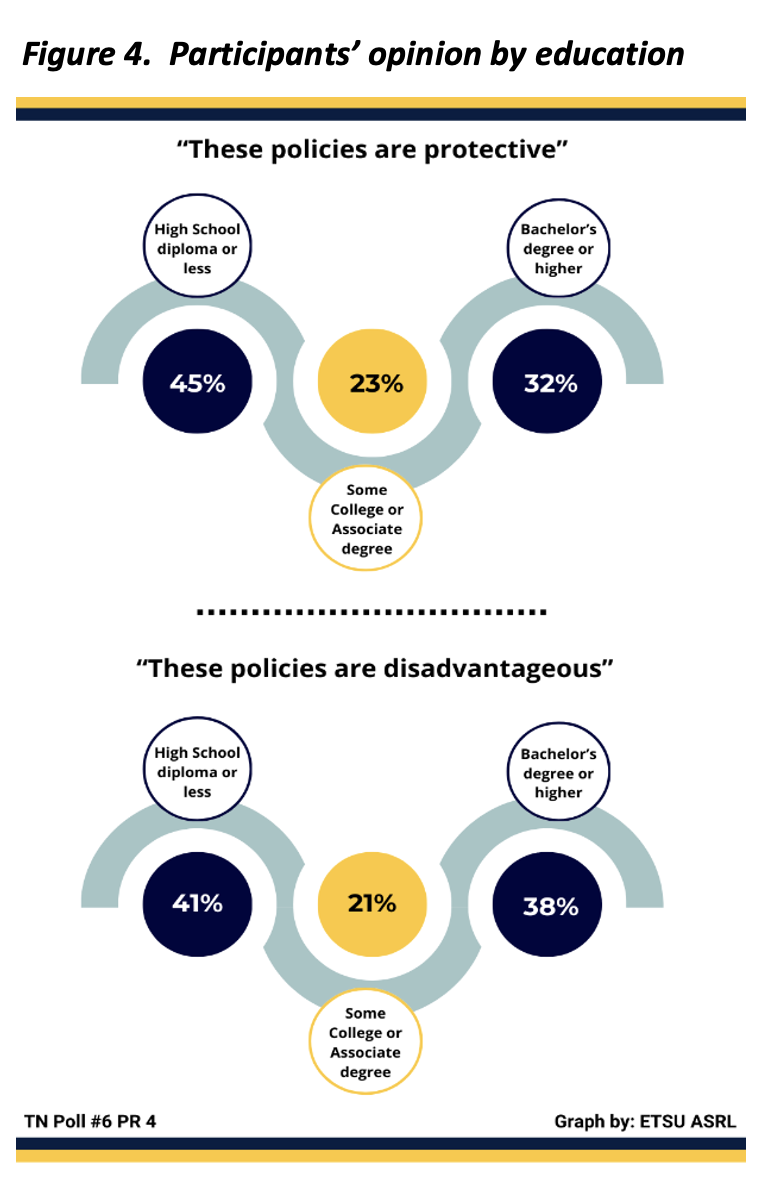
Reference:
1 Amendment to the Age-Appropriate Materials Act of 2022, SB 09666 Public Chapter Number 472 (Tenn. 2023). Tennessee General Assembly Legislation.
This is the fourth in a series of data releases from The Tennessee Poll. We provide methodological information, margin of error estimates, as well as detailed tables with analysis on each question by different demographic categories. To find these, or to be added to our distribution list, go to etsu.edu/tnpoll. Graphics are provided for press use.
Important Notes:
This press release was originally due to be released on Oct. 18. Due to the devastating impact of Hurricane Helene on our community, we delayed the release series. We at the Applied Social Research Lab ask that you keep our impacted Tennessee, North Carolina and Virginia communities in your thoughts. The toll on our communities has been profound, and your support can make a difference. To learn how you can help, visit the ETSU Response page, “Bucs Rebuild Together.”
About the Tennessee Poll
The Tennessee Poll is conducted by the Applied Social Research Lab (ASRL) in the Department of Sociology and Anthropology at East Tennessee State University. ASRL is directed by Dr. Kelly N. Foster, professor of sociology.
The Tennessee Poll is an annual public opinion poll funded by ETSU. The mission of The Tennessee Poll is to provide the citizens and governance of Tennessee with neutral, unbiased information on Tennesseans’ perceptions of issues that impact their health, education and quality of life.
Though the project has been internally funded to date, there exists the possibility of outside researchers or organizations being given the option to purchase space for questions on future polls. Should this occur, any and all funding sources will be noted in the methodology report for that particular poll.
The Applied Social Research Lab is a member of the Association of Academic Survey Research Organizations (AASRO) and adheres to the reporting requirements of the American Association for Public Opinion Research Transparency Initiative standards in research reporting.
For detailed information on The Tennessee Poll, including methodology and additional analysis, visit etsu.edu/tnpoll.
About the Authors
This press release was prepared by Tolulope Adeusi and Drs. Candace Bright Hall-Wurst and Kelly N. Foster. Graphics prepared by Ms. Morgan Jones Kidd and Tolulope Adeusi. For information and biographies on the contributors to this release, see etsu.edu/asrl.
These questions were the product of a collaborative process with our colleagues in the College of Education at ETSU. We wish to acknowledge and thank Drs. Natalia Ward and Rena Moran for their help in designing the questions included in this module as well as their partnership on other research related to this topic.
East Tennessee State University was founded in 1911 with a singular mission: to improve the quality of life for people in the region and beyond. Through its world-class health sciences programs and interprofessional approach to health care education, ETSU is a highly respected leader in rural health research and practices. The university also boasts nationally ranked programs in the arts, technology, computing, and media studies. ETSU serves approximately 14,000 students each year and is ranked among the top 10 percent of colleges in the nation for students graduating with the least amount of debt.
Stay in Touch
Follow ETSU on Social
 Stout Drive Road Closure
Stout Drive Road Closure